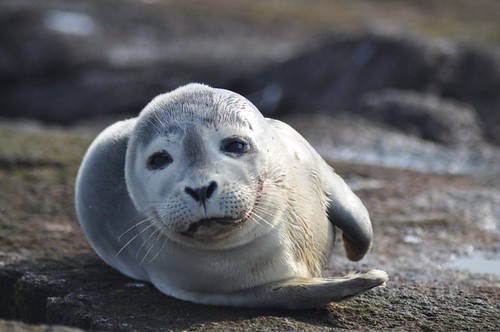Harbor seals (Phoca vitulina) are true seals that inhabit temperate and Arctic marine coastlines. They are one of the most common marine mammals found in the U.S. West and East Coasts and can be seen resting on rocks and beaches along these coasts.
Physical Traits
Harbor seals have a rounded head with a fairly blunt snout and lack external ear pinnae. They have ‘V-shaped nostrils and long whiskers, and their size ranges from 140-185 cm in length. They exhibit various color variations, usually grey or brown with fine spot-patterned fur.
Life Span
The average life span of harbor seals in the wild is 25-30 years, though some individuals may live up to 40 years old.
Habitat
Harbor seals inhabit temperate and Arctic marine coastlines in both the Atlantic and Pacific oceans, ranging from Alaska to Mexico in the Pacific Ocean. They prefer shallow waters near shorelines, such as estuaries, sandflats, rocky shores, mudflats, kelp beds, bays, and lagoons.
Diet
Harbor seals feed mainly on fish such as herring, codfish, salmonids, flounder, and pollock; they also eat squid and crustaceans like shrimp or crabs.
Reproduction
Mating season for harbor seals occurs between April to June, depending on location; females give birth to one pup after an 11-month gestation period. Pups are born with white fur, which molts into adult colors within 2 weeks of labor; they nurse for 3-4 weeks before weaning off their mother’s milk onto solid foods like fish or squid.
Conservation Status
The conservation status of harbor seal populations is currently listed as Least Concern by IUCN due to their large population sizes across their range; however, some local populations may be threatened due to human activities such as overfishing or pollution of habitats.
Interesting Facts
- Harbor seal pups can swim shortly after birth!
- Harbor seals have been known to dive up to 1 km deep while hunting for food!
- Harbor seal whiskers help them detect prey even when visibility is low underwater!

